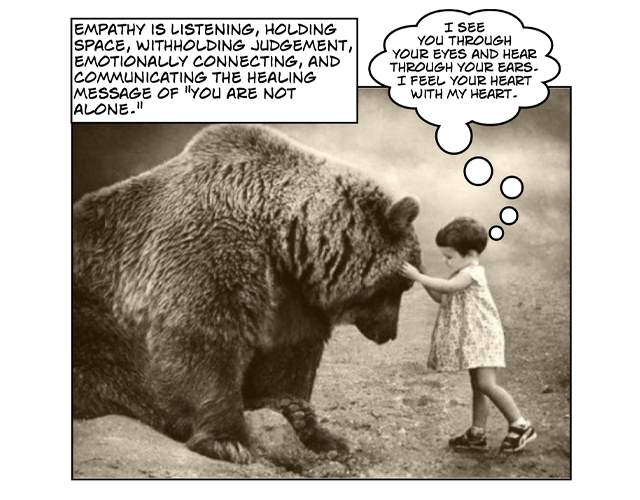By itself, of course, listening is not enough. It needs to be paired with empathy. Listening requires putting yourself aside to be open and receptive. It takes work: you need to exert some genuine effort to put your partner first. Like most things, it gets easier with practice, but effort is always a part of listening.
Empathy puts listening into action. It is what you do with what you hear. When you empathize you make such a strong connection with your partner’s feelings, that you actually come to experience them, in a very real sense, as if they were your own. When empathy is deep, your self becomes less noticeable to you, except to the degree you know that you are experiencing your partner’s feelings. It’s an experience of deep identification and it creates union between the two of you. This depth of empathy can have a quality of spiritual selflessness. Many people have great difficulty allowing this kind of experience, but once you are in the midst of this kind of empathy it does not require effort.
When you are empathizing you also convey with words, gestures, sounds (likewise silence), and with the expression on your face (really with your whole being) that you get what your partner is feeling. That’s the natural outcome of your deep identification with him or her. But this kind of deep, genuine empathy is not a skill that can be learned. Rather, it is a quality of being that we learn to allow ourselves. Your partner can sense what is not true in the communication, which is why simply being yourself is such an important facet of this.
Sometimes when you experience a lack of empathy, it comes from some way your partner is not quite revealing himself to you. Your honest expression of difficulty in connecting may help. Tell your partner that you are trying and can’t quite feel his experience. This might help him dig deeper in himself to help you understand. At the very least, explaining your difficulty conveys your wish to really empathize. This has a truer ring than the false tones of empathizing when you do not.
Sometimes you lack empathy because you are consumed with your own hurt or distress. Don’t hold back. Tell your partner what you are going through. You may be the one who is in the most need at the moment. Of course, if you regularly make such a demand, this probably reflects a barrier in yourself to empathy.
Empathy is not only for our partners, but for our selves as well. We often fall short. Our obstacles to empathy are very real and usually emerge from childhood. Most of us get the active, negative message that some of our feelings are unacceptable. Many of us get the message that we are unacceptable because of our feelings. Some children are manipulated or exploited when they reveal a feeling, while others carry the burden of their parents’ feelings. Some people grow up in families where the response to feelings tends to be empty, flat, or absent. No wonder that empathy is such a hard thing for couples to establish in their relationship!
One aspect of couple therapy is to help you process the barriers to empathy that come out of childhood experience, so that with your partner, a new kind of empathic connection can form. The benefit is that you develop a deeper, more profound experience of empathy for your partner and for yourself. This provides a bridge across the distances, differences and reactivity that are inevitable in marriage. When empathy is present it opens the current that carries closeness and emotional safety, and allows the flow of regard and recognition. The deeper experience of understanding is a basis for cooperation and collaboration.
With empathy for the struggle for a close relationship,
Robert Ogner,


